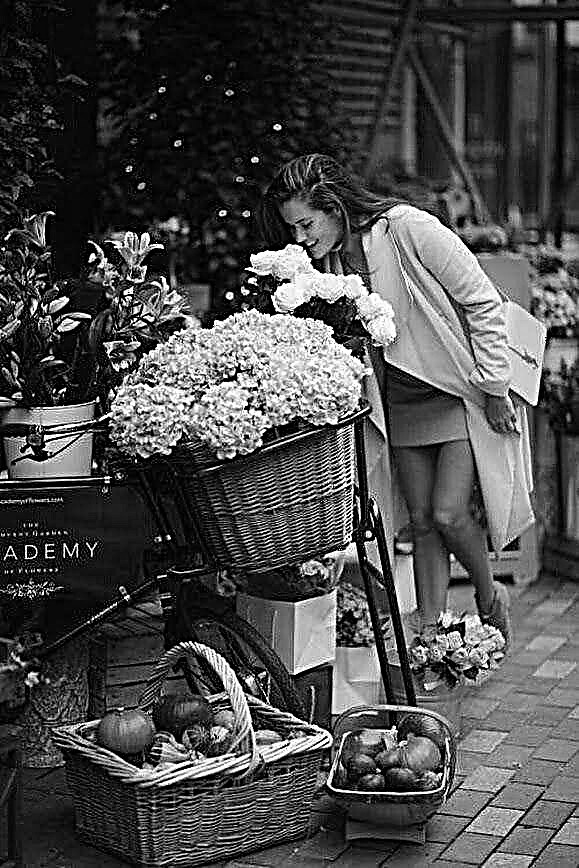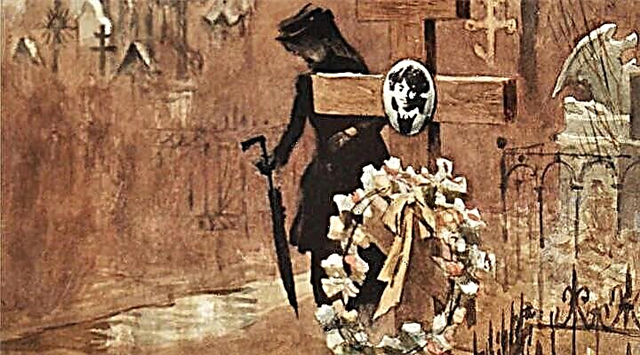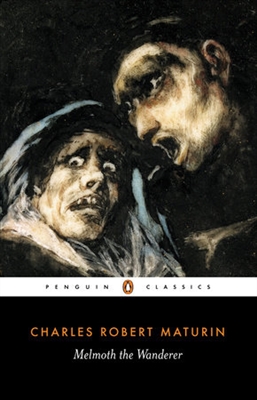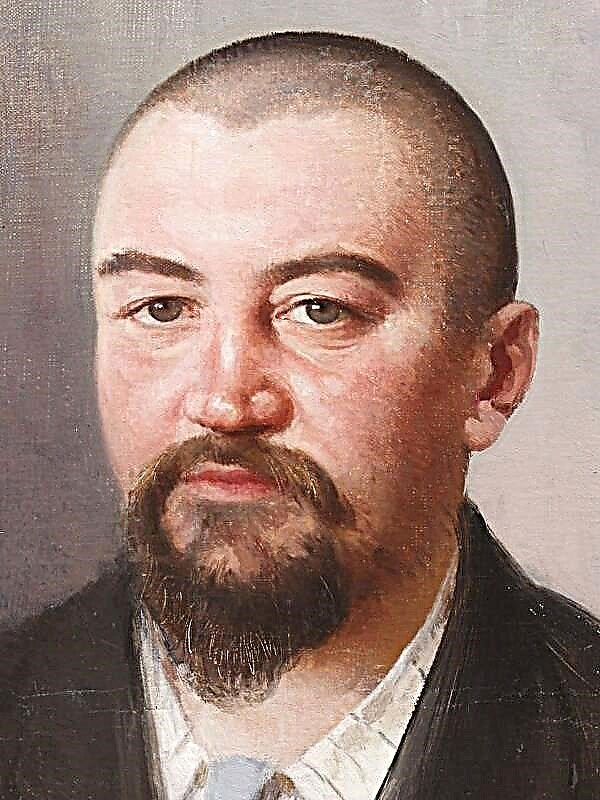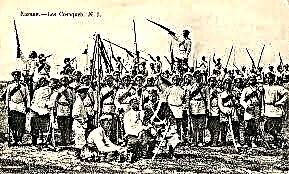Katya, short, pretty and still very young, is Mitya's lover. She studies at a private theater school, goes to the studio of the Art Theater, lives with her mother, “always a smoking, always a well-dressed lady with crimson hair,” who had already left her husband. Mitya, a thin and clumsy brunette with “Byzantine” eyes, often comes with them, and Katya comes to his student rooms.
She and Katya had not yet crossed the last line of intimacy, although they allowed themselves too many when they were alone.
Mitya is completely absorbed in his feelings, unlike Katya, who is too immersed in the theatrical environment. The headmaster of the school, “a smug actor with passionless and sad eyes,” indulges her hobby, and goes on vacation every summer with another student seduced by him. During Great Lent, he begins to engage with the girl individually. In the sixth week of Lent, the last before Passion, Katya, dressed in white as a bride, passes the exam to the director.
Mitya has long felt that Katie’s attitude towards him has changed. December, when they just met, seems to Mitya easy and unforgettable. In January and February, Mitin's love was already poisoned by jealousy and distrust. Now, on the exam, as if "all the truth" were confirmed, his torment.
What was most terrible was the mixture of angelic purity and depravity that was in her, in her flushed face, in her white dress.
In the spring, important changes take place with Katya - she turns into a "young socialite", constantly rushing to tailors and shopping. Her meetings with Mitya are all declining.
At the end of April, Mitya decides to “give himself rest and go to the village”, in a small estate managed by his mother. Katya also believes that they need to temporarily break up and find out the relationship - she is tired of his jealousy, and she is not going to give up a theatrical career for Mitya. At this time, the last surge of Katya’s feelings came. She spends a lot of time with Mitya, as his wife chooses things for him, escorts him to the station on the day of departure and promises to write. They plan to meet in the Crimea, where Katya and her mother should leave in early June.
The younger brother and sister of Mitya, the gymnasium students, have not yet arrived from Moscow, and the first days in the village pass quietly. Mitya is getting used to the old house again. In everything - in the surrounding nature, local girls, in the sweet spring air, he sees Katya, her “secret presence”. Gradually, the real Katya turns into a girl created by his desire.
For the first time, Mitya lives in his native house as an adult, "with the first true love in his soul." Love captured Mitya “even in infancy” as something “inexpressible in human language”. He remembers himself in the garden, next to a young woman, probably a nanny. Then “something jumped up in him with a hot wave”, and then appeared in the guise of a gymnasium neighbor, then in the form of “sudden falling in love at gymnasium balls”.
A year ago, when Mitya fell ill in the village, spring became "his first true love." The immersion in March’s nature and the manifestations of “pointless, ethereal love” accompanied Mitya until December of the first student’s winter, when he met Katya.
Mitya wanders around a small estate and recalls the death of his father nine years ago. Then he “suddenly felt: death is in the world!”, And there was a “terrible, vile, sweet smell” in the house for a long time. Mitya feels the same obsession now, only instead of a terrible death, Katya and love for her fill his world. Time passes, Mitya watches the reviving nature, which is adorned with his love.
Mitya constantly sends ardent letters to Katya and finally receives an answer with the words "my beloved, my only one."
The bowl of his love was full with edges. And just as carefully, he wore it in himself for the following days, quietly, happily waiting for a new letter.
Time passes, the garden dresses with fresh foliage, and there is still no letter from Katya. Mitya knows that it’s difficult for Katya to pack up and sit at her desk, but these considerations soon cease to help. Mitya spends almost all the time in the library, reading poetry about love in old magazines.
Gradually, Mitya was seized with the feeling that “there will be no letter and cannot be, that something happened in Moscow or is about to happen and that he died, disappeared.” At this time, pure sensuality begins to embrace him: lust at the sight of the washing window of the “daygirl from the village”, in conversation with the maid, in the garden, where the village girls flirt with a velvet. Even a mother forever busy with the household notices the torment of her son and advises him to go to the landowner neighbors, whose "house is full of brides."
Mitya’s torment is increasing. He ceases to observe changes in nature and almost does not sleep at night. He becomes ashamed to send to the post office a very busy and already elderly headman. He begins to ride away himself "to that village where there was a railway station and a post office", each time returning with only one newspaper.
His torment reaches the limit. Once, returning through a neighboring, long-empty estate, Mitya decides to shoot himself if there is no letter in a week.
It is at this moment of spiritual decline that the headman for a small fee offers Mitya some fun. At first, Mitya has the strength to refuse. Soon he forbids himself to go to the post office, breaking off these trips with a “desperate, extreme effort of will” Mitya himself also stops writing, humiliatingly praying for love or, at least, for friendship, and forces himself to "wait for nothing."
The headman again hints at "pleasure", and Mitya unexpectedly agrees for himself. The headman offers him the forester’s daughter-in-law Alyonka - "a poisonous young woman, her husband in the mines ... she’s only married for the second year."
The next day Alyonka comes to work in the garden of the estate. Mitya finds in a short and agile woman something in common with Katya - "female, mixed with something childish." A day later, the elder takes Mitya to the forester. While the headman and the forester get drunk, Mitya accidentally collides with Alyonka in the forest and, no longer owning herself, finds out about tomorrow's meeting in a hut.
The next day he is waiting with a terrible tension for a date. During lunch, they bring a letter announcing the arrival of younger children. Instead of being happy with his brother and sister, Mitya is afraid that they will interfere with the meeting. At night, Mitya sees himself "hanging over a vast, dimly lit abyss."
In the evening, after spending his mother at the station, Mitya goes to the hut, where Alyonka soon appears. Mitya gives her a crumpled five-ruble.
It was all the same as before: the terrible power of bodily desire, not turning into spiritual desire, into bliss, into delight, in the truth of the whole being.
When what he wanted for so long has been happening, Mitya rises “completely astonished by disappointment” - a miracle did not happen.
On Saturday of the same week it rains all day. Mitya wanders in tears in the garden, reread the letter from Katya received last night. She asks to forget her, bad, ugly, spoiled. She is madly in love with art, so she leaves "you know with whom ..."
By evening, a thunderstorm drives Mitya into the house. He climbs into his room through a window, locks himself from the inside and, seized by heat, falls into a “lethargic stupor”. In a semi-unconscious state, he sees a “young nanny” from his childhood carrying a “child with a large white face”. The nanny suddenly turns out to be Katya, she hides the child in a chest of drawers. A gentleman in a tuxedo enters - this is the director with whom Katya left for Crimea. Mitya sees Katya surrendering to him, and comes to herself with a sensation of piercing, unbearable pain.
Voices and laughter can be heard from the hall - younger children have dinner there.This laughter seems to Mitya as unnatural "his estrangement from him, the rudeness of life, its indifference, ruthlessness to him." There is no and cannot be a return to what was "like paradise".
Heartache becomes unbearable. “Longing for only one thing - at least for a minute to get rid of it,” Mitya takes a revolver from a drawer of the night table and “sighing joyfully ... with pleasure” shoots himself in the mouth.







